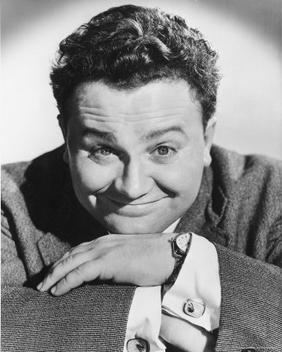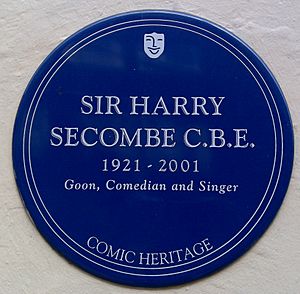Harry Secombe facts for kids
Quick facts for kids
Harry Secombe
|
|
|---|---|
 |
|
| Born |
Harry Donald Secombe
8 September 1921 St Thomas, Swansea, Wales
|
| Died | 11 April 2001 (aged 79) |
| Resting place | Christ Church, Shamley Green, Surrey, England |
| Education | Dynevor School, Swansea |
| Occupation |
|
| Years active | 1946–2001 |
| Television | The Goon Show (Radio) The Harry Secombe Show, Secombe and Friends, Highway Sunday Morning with Secombe |
| Spouse(s) |
Myra Atherton
(m. 1948) |
| Children | 4; including Andy |
| Relatives | Fred Secombe (brother) |
Sir Harry Donald Secombe (born September 8, 1921, died April 11, 2001) was a famous Welsh entertainer. He was an actor, comedian, singer, and TV host. Many people knew him from the funny radio show The Goon Show, where he played many characters like Neddie Seagoon. Harry Secombe was also a talented singer with a strong tenor voice. He starred in musicals and movies, including playing Mr. Bumble in Oliver! Later in his life, he hosted TV shows that featured hymns and inspiring songs.
Contents
Harry Secombe's Early Years
Harry Secombe was born in St Thomas, Swansea, Wales. He was the third of four children. His mother, Nellie, managed a shop, and his father, Frederick, was a salesman. From age 11, Harry went to Dynevor School in Swansea.
His family regularly attended St Thomas Church. Harry sang in the church choir. When he was 12, he performed a funny sketch called The Welsh Courtship at church events. He often performed with his sister, Carol. His older brother, Fred Secombe, later became a priest and wrote several books.
Serving His Country
After school in 1937, Harry worked as a clerk. In 1938, he joined the Territorial Army as war approached. He was very short sighted, so he memorized the eye chart to pass the test! He served in the Royal Artillery during the Second World War. He fought in places like North Africa, Sicily, and Italy. He even called his unit "The Five-Mile Snipers."
During his time in North Africa, Harry first met Spike Milligan, who would become a lifelong friend. In Sicily, Harry joined a group that put on shows for the soldiers. This is where he started creating his own funny acts. Years later, in 1982, Harry visited the Falkland Islands to entertain troops. His old army group honored him by promoting him to sergeant.
Becoming a Star Entertainer
Harry's first radio show was in 1944, for soldiers. After the war, he teamed up with Spike Milligan in Naples to form a comedy duo. In 1946, Harry joined the Windmill Theatre. He performed a funny act about how different people shave. Critics praised his unique humor and singing talent. Harry often said his singing could always save his act if a joke didn't land well.
His big break in radio came in 1951. He became the main comedian for the Welsh show Welsh Rarebit. He also appeared on Variety Bandbox and Educating Archie.
The Goon Show Years
Harry met Michael Bentine and Peter Sellers. With Spike Milligan, they wrote a radio comedy script. This show, first called Those Crazy People, soon became The Goon Show. It was on the air from 1951 to 1960. Harry mostly played the character Neddie Seagoon, who was central to the show's silly stories.
In 1955, while still on The Goon Show, Harry filled in for Tony Hancock on Hancock's Half Hour. Tony had taken an unexpected break. Harry starred in three episodes. These original episodes are now lost. However, in 2017, they were re-recorded using the original scripts. Harry's son, Andrew Secombe, played his father's role.
Singing and Acting Success
The Goon Show's success helped Harry become famous as both a comedian and a singer. Early in his career, he would sing a funny version of the duet Sweethearts. He sang both the low and high parts himself. He trained with an Italian teacher, Manlio di Veroli, and became a successful tenor. He released many popular record albums.
In 1958, Harry acted in the film Jet Storm and starred in Davy. He was invited to perform for the Royal Family in 1958. There, he became great friends with Roy Castle.
Harry's powerful voice led him to star in many stage musicals. In 1963, he appeared in Pickwick, based on Charles Dickens's book. From this musical, he had a hit song, "If I Ruled the World," which became his signature tune. The show went to the United States in 1965. Harry was nominated for a Tony Award for Best Actor in a Musical on Broadway. In 1967, his song "This Is My Song" was a big hit, reaching number 2 on the charts. He also played Mr. Bumble in the 1968 film Oliver!.
Television Shows
Harry then had his own TV show, The Harry Secombe Show. It started on Christmas Day 1968 on BBC1. The show ran for 31 episodes until 1973. It was a sketch comedy show with Julian Orchard as his regular partner. Other famous guests like Spike Milligan and Ronnie Barker also appeared. Harry later hosted similar shows like Sing a Song of Secombe and Secombe with Music in the 1970s.
Later Career and Inspiring Others
Later in his life, Harry Secombe became well-known for hosting religious TV shows. His brother, Fred Secombe, was a priest. Harry presented shows like the BBC's Songs of Praise and ITV's Stars on Sunday and Highway. He also helped advise Harlech Television on programming. In the late 1980s, Harry even sponsored a local football team for young boys called 'Secombes Knights'.
Harry was honored twice on the TV show This Is Your Life. The first time was in 1958, and the second was in 1990. This show surprised famous people by telling their life story.
Awards and Special Recognition

Harry Secombe received many honors for his work. In 1963, he was made a Commander of the Order of the British Empire (CBE). This is a special award from the Queen.
In 1981, he was made a Knight. This meant he could use the title "Sir." Harry often joked about his round shape, calling himself "Sir Cumference." For his coat of arms, he chose the motto "GO ON," a nod to The Goon Show.
Later Life and Passing
Harry Secombe faced some health challenges later in his life. He passed away on April 11, 2001, at the age of 79, in a hospital in Guildford, Surrey. His ashes are buried at the church in Shamley Green. A special memorial service was held for him at Westminster Abbey on October 26, 2001. Many family members, friends, and important guests attended. His tombstone has a loving message: "To know him was to love him."
At his friend Peter Sellers's funeral in 1980, Harry sang a hymn. His friend Spike Milligan joked, "I hope you die before me because I don't want you singing at my funeral." After Spike Milligan passed away in 2002, a recording of Harry singing Guide me, O Thou great Redeemer was played at Spike's memorial service.
The Secombe Theatre in Sutton, Greater London, was named after him. He is also remembered at the London Welsh Centre, where he opened the bar in 1971.
Harry's Family
Harry Secombe met Myra Joan Atherton in 1946. They married in 1948 and stayed together until his death. They had four children:
- Jennifer Secombe (died 2019), who was her father's agent later in his life.
- Andy Secombe, an actor and author.
- David Secombe, a writer and photographer.
- Katy Secombe, an actress.
Myra, Lady Secombe, passed away in 2018 at the age of 93.
Selected Works
Harry Secombe released many popular songs and albums. He also wrote several books, including funny stories and children's books.
Hit Singles
- "On with the Motley" (1955)
- "If I Ruled the World" (1963)
- "This Is My Song" (1967)
Books for Kids
- Katy and the Nurgla (1980)
Autobiographical Books
- Goon for Lunch (1975)
- Arias and Raspberries (1989)
Film Appearances
Harry Secombe appeared in many films throughout his career. Here are some notable ones:
| Year | Title | Role | Notes |
|---|---|---|---|
| 1957 | Davy | Davy Morgan | |
| 1968 | Oliver! | Mr. Bumble | |
| 1969 | Pickwick | Mr. Pickwick | |
| 1970 | Song of Norway | Bjørnstjerne Bjørnson |
See also
 In Spanish: Harry Secombe para niños
In Spanish: Harry Secombe para niños
 | DeHart Hubbard |
 | Wilma Rudolph |
 | Jesse Owens |
 | Jackie Joyner-Kersee |
 | Major Taylor |

